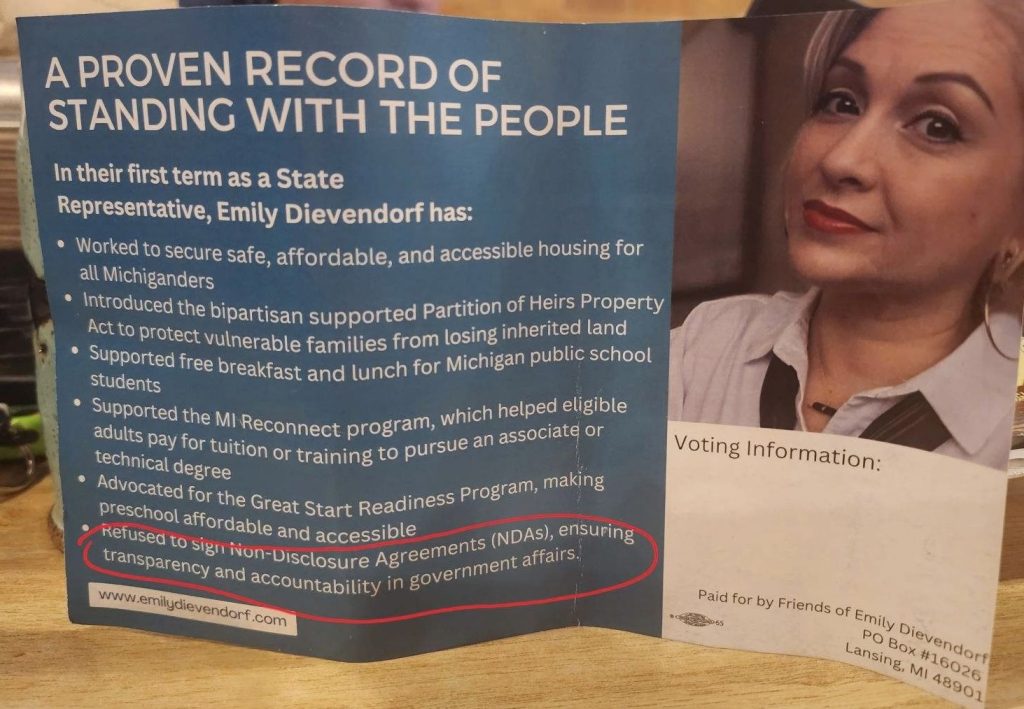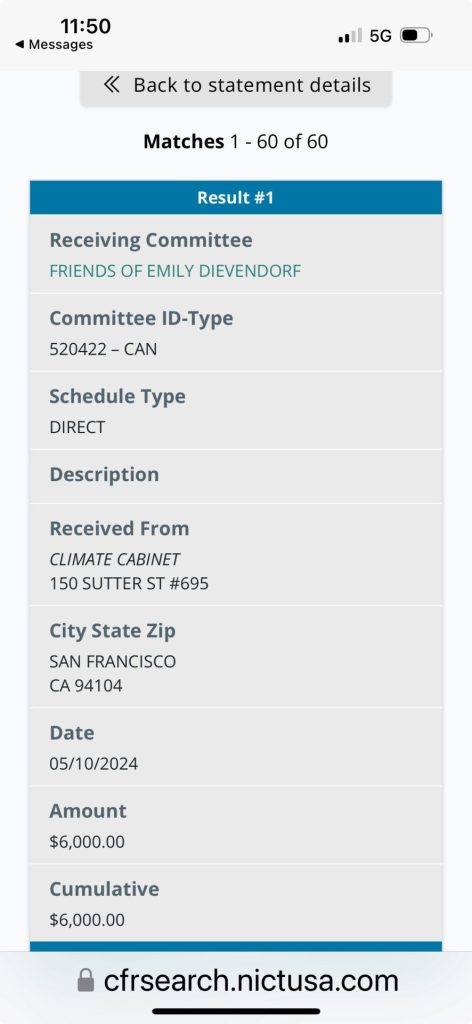LANSING, Mich. (Michigan News Source) – When elected officials sign nondisclosure agreements (NDAs) in the name of economic development, they sell out their constituents’ right to know what’s happening in their own backyard.
In Michigan, this troubling trend continues to accelerate. The Detroit News has recently reported that more than 34 state lawmakers have NDAs tied to economic development projects, essentially keeping the public in the dark until projects and megasites in the state are a done deal. These NDAs were signed with the Michigan Economic Development Corp. (MEDC).
MORE NEWS: Judge to Whitmer: Michigan Can’t Pull Plug on Line 5
Overall, the Detroit News has reported that more than 1 in 5 sitting Republicans and Democratic state lawmakers have signed NDA agreements which prevent them from revealing information on projects that are receiving taxpayer dollars until after the project is announced – which could be years down the pike.
Slotkin’s work-around with NDA signing.
Democratic U.S. Rep. Elissa Slotkin, who is running against former GOP U.S. Rep. Mike Rogers to be Michigan’s next U.S. senator has been telling everyone, after coming under fire, that she didn’t sign an NDA concerning the controversial Chinese-linked Gotion megasite in Green Charter Township near Big Rapids.
While technically true, she did sign an NDA with the MEDC on January 11, 2021 , related to “development opportunities” vaguely described as a “development project.” By the end of 2022, updated details included code names for these projects, allowing politicians to keep them even more under wraps.
The secrecy in the NDAs with MEDC that Slotkin and other politicians have signed has helped lead to the Gotion plant, and other sites, to be developed. This kind of NDA maneuvering lets officials side- step public scrutiny, as the agreements prevent disclosure until projects are well underway, leaving constituents with no real voice in decisions that affect their own towns and neighborhoods.
Transparency or double talk?
In Eagle township, there is also a proposed megasite in the works that is known as the Michigan Manufacturing Innovation Campus (MMIC). And it’s been a bone of contention in the township for quite some time. It has faced public opposition due to concerns about the project’s environmental impact, potential risks to water quality, and lack of transparency in the decision-making process. The former Township Supervisor, Patti Jo Schafer, was recalled in November of 2023 due to signing an NDA about the project and convincing others on the board to do so with limited information given to them about the deal.
State Representative Emily Dievendorf (D-Lansing) is running again for the 77th Michigan House seat, this time against Republican Cady Ness-Smith. The district covers over 92,000 residents across parts of Clinton, Eaton, and Ingham counties, including north Lansing, Grand Ledge, DeWitt, and various surrounding townships. Should Dievendorf win re-election, she would continue to represent the residents in Eagle Township.
MORE NEWS: Michigan Sitting Out Domestic Oil Boom In US
Dievendorf sent out a mailer to voters recently proclaiming she “refused to sign NDAs, ensuring transparency and accountability in government affairs.”

However, documents dated December 14, 2022 show her signature on an NDA agreement with the MEDC, throwing a wrench in her narrative of transparency. This discrepancy raises questions about how many other lawmakers are doing the same while claiming otherwise. When we contacted Dievendorf about her signature on the MEDC agreement, she did not respond to our request for comment.
In a social media exchange with current Eagle Township Supervisor Troy Stroud who pointed out that she signed an NDA in December of 2022, Dievendorf said to him, “Misinformation. I refused to sign NDAs once the damage they do became clear. I’ve remained open and honest with Eagle. I also have fought hard to change the way we do economic development to ensure communities have a say in planning. I have fought for Eagle.”
Cady Ness-Smith responds.
Michigan News Source reached out to Dievendorf’s opponent, Cady Ness-Smith, about the race and she said, referring to Dievendor’s time in office, “Not once did Emily Dievendorf attend one of those meetings (about Eagle Township megasite) or show any support for the community.” Ness-Smith went on to say that Dievendorf ignored the citizens of rural Clinton County when they “begged her to vote against the state taking control of wind and solar development away from local government. Dievendorf straight up ignored her constituents on the issue, all while accepting a $6,000 donation from a San Francisco extremist climate group. That donation has since been exposed as a campaign finance violation in a recent MIRS article.”

Current Eagle Township Supervisor Troy Stroud is endorsing Ness-Smith in the election as someone he trusts to do what is best for Eagle Township. He says in a social media post, “She stood with us as we fought the Eagle Mega Site. She spoke at the meetings. She worked the petitions. She went door to door during the recall.” Ness-Smith also has the endorsement of the Michigan Farm Bureau.
While Representative Dievendorf is just one example of signers who are putting secrecy over community interests, she is far from alone with more and more lawmakers joining the ranks of secrecy, signing NDAs for projects involving taxpayer money without community input. Whether it’s semiconductor megasites in Genesee County or other projects, by the time communities are informed, it’s usually too late for residents to push back.
What are politicians hiding?
There’s a well-known saying: “You don’t know what you don’t know.” It points out the blind spots in a person’s knowledge – things they may be unaware of without even realizing it. NDAs encourage this,
restricting lawmakers from sharing details about development projects that communities have the right to know about and ask questions about, including information about potential job creation, investment specifics, site locations, traffic, environmental issues, water use and more.
When these projects are finally revealed, they’ve already been set in motion, usually making community resistance futile. By the time the public hears about the projects, it’s a “take it or leave it” scenario – except they don’t get to leave it. The community is stuck with the results of deals made behind closed doors.
When secrecy trumps transparency.
The push for NDAs is justified by some lawmakers as a necessity for competitive economic development. But shouldn’t transparency and public input take precedence when taxpayer money is on the line? By shielding megasite plans until the eleventh hour, officials effectively deny citizens the right to influence decisions that impact their own communities.
Lawmakers who sign away transparency to secure deals may see it as a political win, but it’s the residents who lose when they find out what’s happening after it’s too late to object.
